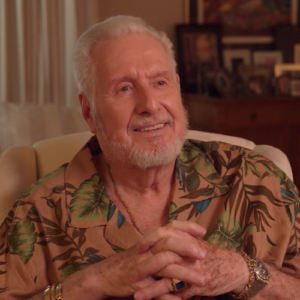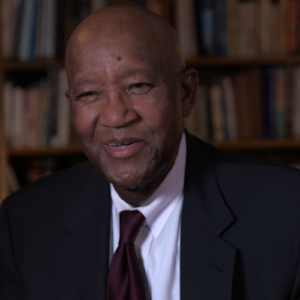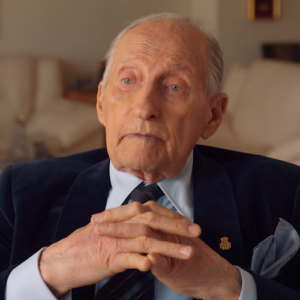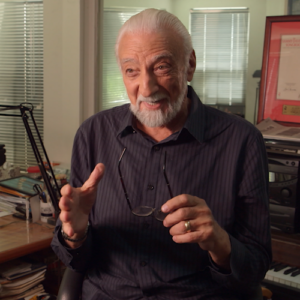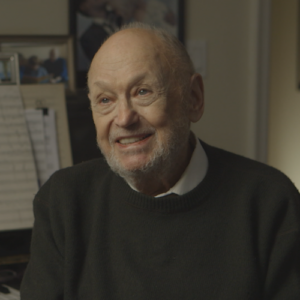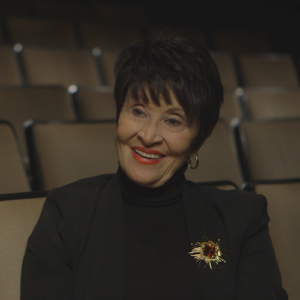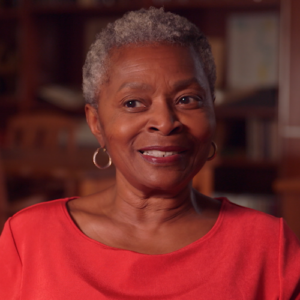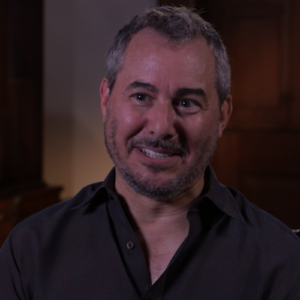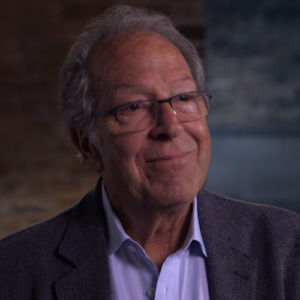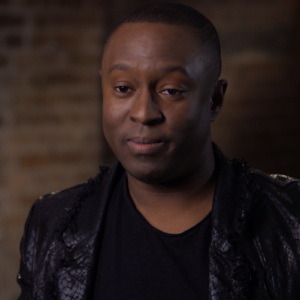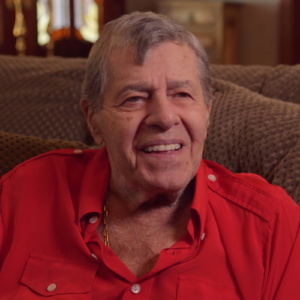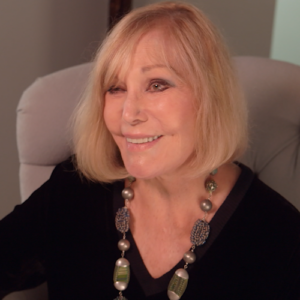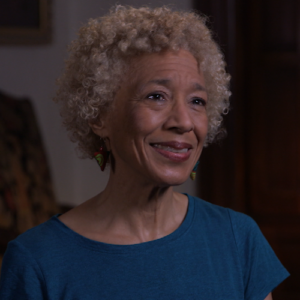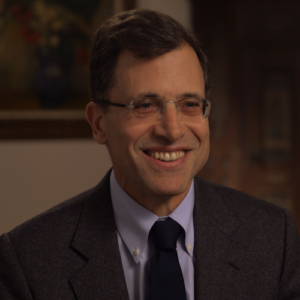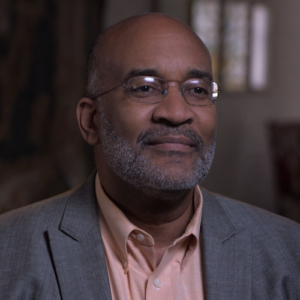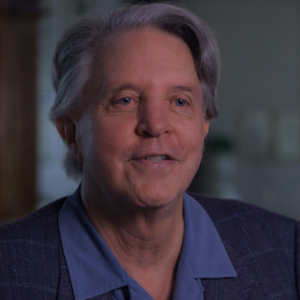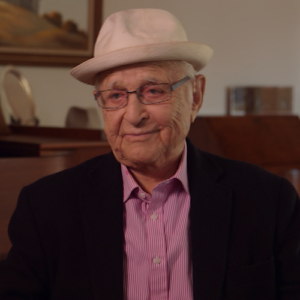Interviewer: So a quick question. Who was Sammy Davis Jr?
Will Friedwald: Sammy Davis Jr was a African American entertainer famous for being able to do lots of things wonderfully. Whereas you can characterize most entertainers while he’s a singer, he’s a comedian, he’s a trumpet player. Sammy was the guy who could do everything if there was, you know, anything that was considered show business. He did acting, singing. A fantastic dancer, a great multi-instrumentalist who could play half a dozen instruments, drums, trumpet, vibraphone, and a fantastic impressionist as well, and a terrific just about anything that you could do in show business, Sammy did. He was sort of the paradigm of 20th century entertainment.
Interviewer: Great. So just one more time. So what does that mean to be the paradigm of 20th century entertainment?
Will Friedwald: Well, he worked in every medium he was except for radio. I got him. That was it. Do you have any Saturday appearances on the radio? I guess I’m. I don’t know of any, but television certainly was good. Sammy Davis worked in every medium that there was television, motion pictures, nightclubs, concert halls, Vegas casinos. He played in all kinds of places. And he opened all kinds of doors for African-Americans. He was sort of the one of the very first Jackie Robinson’s of show business to go to places where black performers had gone before. And even more than those who came before him, like, say, Lena Horne or Louis Armstrong, who didn’t in their work. They didn’t they were sort of unto themselves and they rarely appeared with anything with white performers. Whereas on the other hand, Sammy was probably the first black man to be seen in the media being treated as an equal by the larger white society and by the white entertainers that were his peers, like most famously, Frank Sinatra and Dean Martin, the other members of the Rat Pack. So Sammy was in addition to being a great entertainer, we remember him as a civil rights pioneer and a man who did a lot for the cause of integration in America and the world. And he certainly helped change the images that were out there of what a black man could do and what a black man could be.
Interviewer: So talk about his early days with the Will Mastin Trio and that sort of last gasp of vaudeville and touring America. How about that?
Will Friedwald: Well, the Will Mastin Trio were a vaudeville unit that toured from well before. I got. The Royal Marsden Trio evolved out of a vaudeville troupe where Sammy’s father worked, and the man that he referred to as his uncle really wasn’t. But it was a symbolic uncle, Will Mastin. And they pared it down from a vaudeville troupe into a trio with the addition of Sammy. And it’s sometimes described as the last days of vaudeville. And of course, it was. But that doesn’t mean it was just this, like, perceived as a dying art form. It was they were very popular group and the circuit was very healthy into the I mean, of course there was a reduction in the age of talking pictures, but it was the movies that really supported the last two decades of vaudeville. They would have live performers in front of films, and a lot of performers work that way into, you know, it really was television that finally killed it off. But Sammy and his father, his uncle, as he called them, worked throughout the America up until World War Two. And even after they kept going, it was it was a really strong act. And, you know, it wasn’t like they were there was never a period where they were desperate or it wasn’t like, you know, the Roses and Gypsy, you know, where they were in one shoddy act after another. They were really headliners and they played major theaters. And that’s where Sammy first got to meet Frank Sinatra. It was at the Capitol Theater. So they were really, you know, with the headliners, and they were really a very successful group.
Interviewer: So just go back that a little bit for people who don’t know. So like a vaudeville trio would perform in what were some of the venues they would perform before movies. That sounds that it might set make sense.
Will Friedwald: Well, they traditionally vaudeville was all live theater, and it was considered a step down from what was known at the time as legitimate theater, which was Broadway, and which was, you know, Broadway would be anything from Jerome Kern to Shakespeare at that point. But vaudeville was live theater that was almost like, you know, you could say it was like the YouTube of its day. It was very plebeian. Anybody could afford to come in. And it was all one live act after another, every every possible thing that anybody thought would be entertaining from dancers and jugglers and dogs to comedians, to singers, to, you know, trumpet, soloists, anything that could keep people distracted for 7 to 10 minutes was a vaudeville act. And when talking pictures came in, it sort of got re shifted and they transitioned from strictly pure live shows to these kind of movie vaudeville type shows where they would be, especially in all the major cities, there would be a whole evening’s entertainment that was roughly half live and roughly half, you know, on film. So in addition to short subjects and newsreels and cartoons and, you know, at least one or two features, that would be at least an hour of live performances, often headlined by a big band like Benny Goodman or Glenn Miller or, you know, on the black side, Duke Ellington or Count Basie. And there would be room for all kinds of singers and dancers and acrobatic acts that would perform live. And when you watch The Ed Sullivan Show in the fifties, that’s sort of the document of that. I mean, this is what those shows looked like. And this kind of movie theater of vaudeville was a huge trend. And it lasted from the dawn of sound right up until even into the early days of television. It finally went out of business when television became widely popular, which wasn’t until the early fifties. And Sammy Davis and the Will Mastin Trio were very big opening in front of movies. Of one of the engagements that Sammy always talked about was at the Capitol Theater, and he always remembered that because they were part they were on the same bill with Frank Sinatra. And that’s where he got to meet Sinatra for the first time. And that was something he always obviously he remembered this. Sinatra was already his hero, but movie theater, vaudeville was a big deal in those days. It was a huge entertainment medium. It was you know, you could see talent equivalent to that of a Broadway show for $0.25. $0.50 was a huge deal in the thirties and forties until World War Two and beyond. That too much.
Interviewer: Quickly, before you go on, Will. Yeah. You know, for Sammy, his father and his self-professed uncle, when they were on the vaudeville circuit, they were sleeping in. You know, trains, railroad stations are not able to get food sometimes.
Will Friedwald: Especially in the south.
Interviewer: But speak specifically to Sammy.
Will Friedwald: Right.
Interviewer: And his experience. And also sometimes when you focus, you’re looking over here trying.
Will Friedwald: To look at Larry, hard as that might be.
Interviewer: I mean, there you go.
Will Friedwald: I tend. Another thing I do and stop me if I do, I tend to close my eyes when I concentrate. So I’m sure you don’t want that. This is like the the George Shearing story. You know, concentrate.
Interviewer: Your hands and try to. Here you go.
Will Friedwald: One. One sort of. Unpleasant. Flip side of Sammy’s early experiences in any kind of traveling theater, be it vaudeville or whatever was, especially in the South African American entertainers had to lodge in the most dehumanizing conditions because there were not hotels that were open to them. They had to find black families that would be willing to take them in. It was very difficult to find food and shelter on the road. And even in the north, where segregation wasn’t legal, it was still widely understood that there were places where a black individual could not go. They were just not welcome in certain places. And even though segregation was not legal. If Sammy had wanted to, he could not buy an apartment or a house in much of Manhattan just because of they had these restrictive housing clauses that were all over, even in the north, which was supposed to be more enlightened in the South. And that was a situation that Sammy himself would do a lot to change just by virtue of being, you know, such a great big star who was, you know, eventually, over a long, slow period, eventually be recognized by anybody as a by everybody as a major, major talent. And he helped change that perception and helped change that whole situation. But for him growing up, it was, you know, really they were constantly being told that they were inferior and they were second class citizens. And Sammy always talked about how his father and his uncle tried to shield him from that. And whenever they encountered something that we would obviously recognize as racism, the Will and Sammy Senior would explain it to him in some other way that, you know, they thought they were protecting his feelings and it turned out to sort of backfire on him as an adult. He got into the Army and, you know, experienced racism for the first time in the in the most direct way, an unpleasant way possible.
Interviewer: Talk about that.
Will Friedwald: Well, Sammy talked about how it was kind of a a very unusual situation that he was in. One of the first integrated units and the armed services were rigorously segregated up until 1948, I believe, when Harry Truman was the first two to integrate the armed for the armed forces. And but for some reason, there was this sort of experimental unit in the latter part of World War Two, and Sammy joined it. And it seemed to confirm everybody’s belief that the the sort of the services should be segregated because the black soldiers and the white soldiers did not get along. And there were and they made and if they were going to try such a thing, why would they put a bunch of Southerners who were not likely to be sympathetic to African American soldiers? You know, it didn’t really make sense the way the Army did it. And Sammy had a terrible time. It was it was worse than being in prison. It was he was, you know, brutal, routinely humiliated and beaten down and just had the most horrendous time in the service. And it’s almost like whoever put them or whoever had that idea was trying to prove that integration of the armed forces would not work, you know, by by setting it up in the worst possible way. No, they continually beat him down in the most humiliating way. They tried to force him to drink a cup of urine. They tried to paint the N-word on his chest when a white woman, the wife of one of the officers, just expressed the fact that she admired him as a performer. And this is a woman that Sammy had had no contact with. They beat him up just for attracting the attention of a white woman. And it was if Sammy didn’t know about racism before the Army, he certainly learned about it then, then and there.
Interviewer: Sammy is discharged and he returns to show business in the late forties. What is the American scene for a black entertainer as the 1950s began?
Will Friedwald: At the end of the war. African-American soldiers came home and they’ve been fighting for free. That was our moral put it. They’ve been fighting for freedom abroad and came back to racism at home. And there was this general feeling that things had to change, that this was the moment when change would start. It was a period when Frank Sinatra was famously campaigning, would put his career on the line for what was then called tolerance, that you should be nice to people that don’t go to the same church as you do or have a different color skin. And this idea is starting to appear more and more often in mainstream culture, famously in South Pacific, that, you know, that there’s room for everybody in postwar America, especially, you know, now that we had the Nazis as a negative example and an example of what not to do. And it’s slowly beginning to catch on in the postwar era. And you’re slowly beginning to see like the most the biggest sort of major step was the integration of the armed forces in 1948, when there was no longer black servicemen and white servicemen. And gradually the musicians unions were starting to become integrated up into the fifties. You had a black musicians union and a white musicians union, and they slowly did away with that. And gradually, you know, black entertainers are more and more welcome. You have the first sort of really big black crooners. Before the war, there were black, the very sexy, some very successful black entertainers who made very successful records like Ethel Waters and Louis Armstrong. But you never really had the idea that there could be a black Sinatra like Billy Eckstine was, or to a certain extent, Nat King Cole was the idea that a black man could sing love songs, could sing Cole Porter and Richard Rodgers and things like that. You didn’t see that before the war. And so it was it was this sort of slow change that was starting to come. And Sammy was at the forefront of that. He talks about how in the early days of the Will Mastin Trio, when he began to do impressions, it was acceptable for him to do an impression of Stepin Fetchit or Louis Armstrong, but he couldn’t do Humphrey Bogart or Edward G. Robinson because the idea of a black kid sounding like a famous white actor was considered sacrosanct. And, you know, even early on, Sammy was starting to break down those doors. After the war, more and more, you see this idea of these kind of these institutions will going away, you know, sort of fading down sometimes very deliberately. Somebody like Benny Goodman went out of his way to hire black musicians for his band and show black and white musicians playing on the same stage. And of course, Sinatra, who was Sammy’s great friend and inspiration, was a guy that always was trumpeting, you know, equality between the races, you know, every chance he could get, you know, even when it put his own career into jeopardy. So, you know, Sammy is really at the forefront of that. And the Will Mastin Trio is at the forefront of that. The idea that, you know, just for a black act to open to play a white nightclub and I’d call there was most of the patrons were white was fairly unusual. By the late 1940s you never saw a black trio in the Persian Room, you know, before that time or in El Mocambo, Oliver Tambo said, I’m a combo. Yeah, the Mocambo or El Morocco or the Stork Club. They didn’t have. There was a famous incident when Josephine Baker came into the Stork Club and then said that she couldn’t get observed. So, you know, the integration of the nightclubs was a very big deal at that time and of theaters, you know, for black people and white people to sit together in the same theater was a major deal at that point. Sammy said that when he was a kid working in the Will Mastin Trio, he started to do impressions. And at that point, it was considered okay for him to do impressions of famous black celebrities and black actors like Stepin Fetchit or musicians like Louis Armstrong. But when he wanted to do impressions of famous white actors like Edward G. Robinson or Humphrey Bogart, that was considered sacrilegious. You know, for for a black kid to stand there, even a vote, even to evoke in an impression of a famous white actor was considered taboo, something that you just didn’t do.
Interviewer: Excellent. So let’s talk about Sammy. When we talk your next few questions about Sammy as a singer. Okay, so his original recording sessions with capital were largely a bust. If he signs with Decca and he has a huge hit with Hey there. How does Sammy break through as a singer?
Will Friedwald: Well, Sammy was in the right place at the right time, and he helped, you know, to make it the right time when he started singing for Decca. It was in the wake of, like I say, Billy Eckstine. I get with that. Like I say, yes, I have to start again. It’s not an article, right? I’m thinking too linear.
Interviewer: Yes. That was tough to edit out because.
Will Friedwald: I no good.
Interviewer: Thought to go back to say he was in the right. Sammy was set.
Will Friedwald: As a singer. Sammy was in the right place at the right time. He had come along in the wake of Billy Eckstine and Nat King Cole, and before them there were only certain kinds of songs that black vocalists were allowed to do, usually rhythm songs or things like that, or dance numbers. But it was really unusual to hear a black performer do like a new song from a Broadway musical, unless it was an all black show, a cabin in the sky or something like that. But for a black singer to do a number from a regular white mainstream show like Pajama Game was a new idea at that point. And Sammy really broke through with Hey there. And that was again, that was his first sort of statement that he was a great vocalist, even on a medium where you couldn’t see him, you know, obviously he was a great entertainer and something like television or nightclubs where there was a visual factor, but with Hey there. And his other hits of the mid-fifties, he was working purely on an audio level and succeeding and really, you know, competing. He had the, you know, the big hit on the song, you know, more than the cast album, more than Rosemary Clooney, even, who had a great record of the song. And more than Johnnie Ray. Johnnie Ray had a record of the song as well. His was the version that people remember, and he was the one who kept singing that song for the rest of his life.
Interviewer: Talk a little bit, just even anecdotally about about Nat King Cole and Nat King Cole. How did Nat King Cole blazed some trails for Sammy to follow? I’m sure they. Yeah. How did. What’s that relationship?
Will Friedwald: Nat King Cole was probably. You could. Nat King Cole was just about the first black singer and musician to be accepted by the white mainstream audience. Certainly neck and neck with Billy Eckstine. And he makes his career is a sort of gradual transition from the sort of traditional kind of fare that black performers were supposed to do. And his early work is almost more comparable to Fats Waller as kind of a very party hearty singer pianist. And he gradually adds more and more ballads to his act. And they’re accepted. And he starts making things like the Christmas Song and for sentimental reasons, and the idea that a black vocalist could croon love songs like a Bing Crosby, like a Sinatra was a totally new idea in postwar America at that point. And Nat Cole was really the very, you know, the first and the greatest to get there to be totally accepted by the world beyond the black audience. At that point. They they use the word crossover now, but the general path for almost everybody that they tried to attain was generally to be popular first with the black audience, which at that point was known as the race audience. And then a very few broke. Beyond that. Ethel Waters was probably the most famous example at that point. But Nat King Cole was truly the first guy to be totally accepted amongst, you know, the larger mainstream white world as a man who could sing love songs and who was regarded as a great love song singer in a class with Sinatra, in a class with Perry Como, in a class with anybody who was making records. And Nat Cole opened up doors for everybody. And he and Sammy were very close. In fact, one of Sammy’s best impressions was Nat King Cole. And certainly and Nat Cole was the first African American to host his own variety show and star in his own variety show. He he broke down all kinds of barriers and was truly an innovator and a pioneer.
Interviewer: And are they intend to or his Nat King Cole blazed trail that Sammy, how do you interrelate them to enter?
Will Friedwald: Well, Nat Cole was King Cole was Nat King Cole was six years older, so he was about half a generation ahead of Sammy. And Nat King Cole was huge in many ways. He was one of the first African-Americans to have his own radio show. And, you know, he would definitely was at least a half a generation ahead of Sammy. But it’s not always that neat and that orderly and traditionally. Lena Horne also deserves credit because she was sort of the she was definitely the first African-American vocalist to appear in otherwise all white productions. And even though she wasn’t totally integrated into those films, just the mere fact that she was in them was bigger than anything that had happened before. That’s something that, you know, for all of her incredible achievements, Ethel Waters never really got to that point. So it’s like everybody that comes along, even five or six years later, pushes the. Roll up a little bit further, you know, goes it just goes a little bit deeper. As you know, Lena Horne went behind Ethel Waters, and Nat Cole wouldn’t be on both of them. And then Sammy, you know, by the time Sammy was a full blown, a full blown superstar. I need to say that by the time that Sammy was a full blown superstar in the mid 1950s, he had come further than anybody. And, you know, he almost didn’t. And he almost was at the point where you didn’t need to apologize or to explain, you know, to see Sammy on the Colgate Comedy Hour being hugged by Eddie Cantor. Well, it still was a shocking thing, but it’s much for I mean, you wouldn’t have seen that ten years earlier or even five years earlier. You know, a major white star embracing any kind of African-American on television. But a lot of the forces at that period were pushing towards that. Ed Sullivan was famously open to African-American talent and wasn’t about to be intimidated by the usual things that intimidated people. You Hefner, who had several TV shows in the fifties and sixties, was famously open to integration into presenting African and African-Americans and non African-Americans as equals. So all sorts of people were were open to this idea. And it keeps going further and further until, you know, you have the Rat Pack where you see Sammy Davis. Interacting freely with white people, being treated as an equal, and they make a joke about it. You know, you couldn’t even joke about it the generation before that. While the Will Mastin Trio in its early days was touring, they caught the attention of a short subject’s producer at Vitaphone, and they put Sammy in one of the well, you could say its infamous, but certainly one of the greatest all black short subjects. It was a two reel musical about 2021 minutes long, starring Ethel Waters, and it has all sorts of minstrel show elements at it. But at the same time, it’s a really glorious film of great African entertainers doing what they do best. And Waters is tremendous in it. And as great as she is, Sammy pretty much steals the show from her as a young black tap dancer. He’s just phenomenal. And it’s amazing that Sammy was catching the eye of the talent brokers and the gatekeepers even that early. I think he’s seven years old in that film and. He was. He was kind of proud. I remember watching Sammy on television shows in the eighties, and he was even then, he was still talking about that. It was still a really big deal for him to be in that film.
Interviewer: In the mid-fifties, it was important to certain entertainment moguls, brokers, producers to to open the door. And Sammy walked through it. So it’s an interesting you know what I mean? Sort of constellation of things and society wanting to happen and Sammy being the right person at the right time.
Will Friedwald: Yeah. In the mid 1950s, there were all kinds of forces at work and all kinds of very sympathetic people that were in a position of power to make integration happen and certainly in the popular culture. Frank Sinatra was always in favor of it. Ed Sullivan was famously in favor of presenting as many great black talents as he possibly could. And Eddie Cantor, who was a great humanitarian, was hosting the Colgate Comedy Hour frequently in the 1950s, and he always made a point to support great African-American talents and Sammy Davis in particular. So it’s like as much as the African-Americans did and continue to do. There are also very sympathetic people in positions of power on the artistic side and on the production side that were helping to open the door. And Sammy broke through just at that point as that door was opening. So it was a kind of case of colossally perfect timing, you know, a perfect storm, as it were, that he could just walk through at that moment. Had Sammy been born five years earlier, might have been a an entirely different story.
Interviewer: Fantastic. When did Sammy as a singer to go back to just as a as a performer, not just, but as a performer? When did Sammy find his own voice and how would you describe it?
Will Friedwald: Well, Sammy, one of the issues with Sammy Davis as a singer in particular is that he is so diverse and so multitalented that when you concentrate on any one of his things, the dancing, the impressions, the singing, the comedy, you know, you have to look, you know what? Other than the sheer diversity, you know, what is Sammy’s style? And of course, even just as a singer, you know, he’s a million things at once. He’s Frankie Lane one second and he’s on Monroe the next. And then he’s Billy Eckstine, then he’s Nat Cole. And to a certain degree, that’s even when he’s not doing his impressions, but he’s gradually absorbing all these influences, and he gradually does come up with a uniquely Sammy Davis kind of a sound one that’s highly influenced by Sinatra and highly influenced by Nat King Cole, but which is, you know, nonetheless a unique sound that’s all his own. And that’s why, interestingly enough, people talk about the fifties and sixties as the era when rock and roll came in, and all of a sudden the old time singers weren’t popular anymore, which isn’t really true. It was a time when all these different musics coexisted. And in the 1960s is the era when the Rat Pack, when Sinatra, Dean Martin and especially Sammy had more hits than ever. They were constantly on the charts. In those years, it wasn’t like rock and roll just swept everything away like a tidal wave. These guys were hugely popular and they had tons of hit records, and Sammy had a very distinctive sound, particularly by the mid 1960s when he was landing one big song after another and a very sort of distinctive kind of a Sammy Davis Jr kind of a song in addition to a Sammy Davis Junior, kind of a sound.
Interviewer: So what do you find he brings? He’s hardly laid back. I mean, he brings a lot at stake to his performances as a singer. Just maybe characterize it.
Will Friedwald: Well, Sammy’s whole I think Sammy’s whole idea, which is a thread that we find running throughout a lot of the great American pop music, is this kind of idea of an intimate, spontaneous connection. I think to me, that’s the way I define jazz, spontaneous, intimate creation. And so much of it has to happen in the moment. And Sammy, to a great extent, that’s absolutely 100% true. He was thinking of stuff in the moment, but at the same point, he’s creating that illusion of spontaneity that’s partly real and partly manufactured and certainly deliberate. And you get this element of randomness in Sammy that keeps everything exciting. I mean, one one record I always go back to is that old black magic where he spontaneously throwing in like all these old movie quotes and putting in all this the stuff that seems just so random and, you know, you’re just like on the edge of your seat trying to figure out what he’s going to do next. And Sammy’s whole career is full of these moments like that where he seems to be thinking of stuff, you know, right on the spot and you know that he’s doing it. He’s developing at night after night. He’s throwing in one thing one night. And if it works, he keeps it. And if it doesn’t work, it’s gone by the next night. And his whole career stockpiles like that, you know, just one thing after another. You watch it work and then, you know, if it works, it works. And he keeps doing it and he keeps adding things and taking things out. And it’s it’s developed over a long time and it’s crafted to seem spontaneous. And the reason it works so well is because there is that element of reckless danger to it. You know, you always think that he could try something and it might just totally flop. And but he’s he’s never afraid to try things.
Interviewer: Great let’s we might be able to to get that all black magic.
Will Friedwald: So is there a clip of that.
Interviewer: I know very well or at least maybe play the audio? Maybe it was so great what you said, but maybe just go back and just talk about that terror of that terrain and that song maybe a little more slowly about he does this and then he throws in movie cliches and then he imitates just the sort of cornucopia of corniness that you have.
Will Friedwald: Now, I particularly like that old black magic. I think that’s a great example of Sammy with this this cultivated spontaneity where he’s using all the songs breaks. You know, the song is written in such a way, in the arrangement, in such a way that there are breaks between the lines. And that’s a total jazz thing, you know, that’s where, you know, New Orleans jazz evolves out of the ensemble would stop and one musician would just play like a two bar break. And from there it evolved into these full blown solos, you know, eventually to the point of John Coltrane improvising for an hour. But Sammy would just throw in these little things in the breaks. And sometimes they were impressions, sometimes they were gags, sometimes they were one liners, sometimes they were lines from movies or even, you know, just anything that was on his mind. And it had this impression. It created this idea of just total reckless abandon, total, total spontaneity. And the great thing of it, Sammy, and it’s a cultivated thing that he did brilliantly, is it has if it’s not genuinely dangerous, that, you know, he could come up with something so ridiculous, it’ll just fall on his face. It’s a cultivated aura of danger that there’s this risk element involved. And he could say something so ridiculous that it wouldn’t make sense. And actually the fact that it doesn’t make sense is part of what makes it so much fun. You know, it’s this is total glorious randomness. And that really comes out in that old black magic. That’s like the ultimate example of Sammy just doing everything at once.
Interviewer: Brilliant. Reckless abandon. Let’s talk about another singer who I think has a connection with Sammy is Al Jolson. George Slaughter said that Sammy didn’t want to entertain you. He wanted to pulverize you. Is that is he part of that tradition that Johnson sort of exemplifies?
Will Friedwald: Well. Definitely an ethnic entertainers, especially those with some kind of degree of insecurity. And from what we know about Jolson. One of the reasons he was always talking about how great he was is because he was deep down he was insecure and needed to bolster himself. He was trying to convince himself as much as he was trying to convince everybody else how great he was. And Sammy grew up in a time when the whole culture was telling him he’s inferior, he’s second class. So he really needed that. So when either one of them would step out on stage, they had to convince you. That always seem like they have something to prove. And that to a great degree, that’s their charm, is they’re not going to go off that stage until they’ve gotten that standing ovation. They want you to stand up and give them applause more than you want to do anything else. And they’re not going to let you alone. They’re going to be in your face until you’re standing up and applauding. And they knew how to do it. You know, they they had that toolbox, They had that wheelhouse. They knew how to get you to do that. And they had that drive. They want you to applaud more than you want to not applaud.
Interviewer: Terrific. All right. So Sinatra, what was his influence on Sammy?
Will Friedwald: Sammy first noticed Sinatra at the height of the early Senate trauma period, as they called it at the time. You know, the sort of the first wave of Sinatra as a huge star, which is right after he leaves Tommy Dorsey around 1942 43. And Sinatra is the biggest thing. And anybody with any intelligence saw immediately that this was a whole new way to sing what became the Great American Songbook. And Sammy was among the first to really realize that. So was Tony Bennett, even though he was only about 16 or 17 at that point. But people who really were paying attention to pop music knew that this guy was not just a huge star on a trend, but that he was really making a lasting contribution apart from the fact that he was successful and good looking and seemed to have, you know, every possible thing you could ever want. So there were lots of reasons that Sammy would idolize Sinatra. But I think at the core of it is the fact that just Sinatra was so great and he realized that and he saw that there was a new way and he said there was something there that he could add to his own art, you know, to his own interpretation of songs. And he recognized all these things. And Sinatra and Sinatra was nice to him in a way that some white entertainers were, and some white entertainers weren’t. At that point, Sinatra was always very encouraging from the very beginning. Although it’s sometimes said that Sammy liked to tell people that after he had the accident that Sinatra was the first one to visit him in the hospital. In fact, it was Eddie Cantor. I knew that from Jess Rand, who had been Sammy’s agent at that time. Eddie Cantor was the first. Not that Sinatra didn’t wish him well and continually encourage him. But Sinatra had this lifelong phobia of hospitals. He wouldn’t come into a hospital for anything, even I mean, maybe to visit his own mother in the hospital. They would have. But for nobody else, he really had this kind of medical phobia. But Sinatra was a great booster of him from the beginning.
Interviewer: Why do you think he’s inserted Sinatra like Mad Libs into the well?
Will Friedwald: Well, Sammy always said that after he had the accident where he lost his eye, that Sinatra was the first one to visit him in the hospital. We know that’s not true. A lot of people claim to be the first one. Jess Rand, who was Sammy’s agent, said it was Eddie Cantor. And the only reason Frank didn’t come was because he had this phobia for hospitals. It wasn’t that he didn’t care about Sammy or was, you know, that escaped his attention, Ed said. But to me, I always find it interesting. Lots of people will make up stories about themselves till like you more. But Sammy was one of the few who made up stories about other people to make them like you more, the more he could play up his closeness to Sinatra, the hipper he was. Sinatra was just this kind of magical icon. Even then, you can evoke, you know, the ultimate in hipness. And the closer, you know, to this day, people play up their connection to Sinatra to make themselves seem happy. You know, he’s just that that magical, you know, that that transcended, you know, the closer you are to Frank, it’s like a step, you know, a step closer to Jesus, almost. He was so transcendent in his supreme hipster ism.
Interviewer: Well, a great writer by no name. Well, FRIEDWALD was quoted as saying, The problem with Sam is he can’t decide whether he wants to be the black Sinatra or that person.
Will Friedwald: I know who said that? I quoted somebody.
Interviewer: You can claim it, but talk about that idea. I mean, I.
Will Friedwald: Think it was Earl Wilson.
Interviewer: Really? Well, okay.
Will Friedwald: And now it was. It was in Earl. It was in Earl Wilson’s column written. It was written.
Interviewer: But at.
Will Friedwald: The time, they said.
Interviewer: The aspiration of wanting to tell that story. Then I’ll ask a follow up, but see if you can find a way to give us that.
Will Friedwald: At that time. And it’s not done so much anymore. Nobody would say, Oh, he’s a black Sean Penn or something like that. But at that time they tended to there was a singer named Harlan Lattimore, who was known as the Black Bing Crosby. There was a singer named Denny Dennis, who was known as the British Bing Crosby. They tended to think in terms of these archetypes breaking down for different markets. And at that point, there was a quip that some of the columnists used to say, Sammy Davis isn’t sure if he wants to be the black Frank Sinatra or the Jewish Frank Sinatra. That’s the way they thought in those days.
Interviewer: Okay. Um, so when I were to come up with the Sammy and Frank relationship, deferential, subservient, obsequious. What’s your take on that? On Sammy’s. Sammy’s aspirations to be Sinatra and how it plays out?
Will Friedwald: Well, the whole relationship of Frank and Sammy, it’s. It’s very tricky, very intricate. To a certain degree, he would be deferential to Sinatra. And there’s a famous story about Sammy criticizing Sinatra in print. And when you read what Sammy said, you know, if he had said that about me, I would have been mad at him, too. And Frank froze him out for saying that. And you really can’t blame. Oh, it’s not a nice thing to say about your best friend. And but, of course, you know, a few months later, they made up and forgave each other. But it was a very tricky relationship when you have these two very volatile personalities. And but they stuck it out. You know, they kept going. You know, some of the last work that Sammy did in his life was appearing with Sinatra up until 1990. I remember I had tickets for Sinatra at Radio City, and he had to cancel because Sammy had died and he couldn’t go on. There was genuine love there. And the amazing thing was that they weren’t afraid to express it in public in a way that you had never seen a famous black star and a famous white star do at the time. It just was never seen that kind of interracial camaraderie. And, you know, people today look back and they say, well, how can they tell those horrible racist jokes? You know, how can they how can they do that? And at that time, the great step forward was to turn racism into a joke, to make fun of it, to put it down, to deflate it, to remove it of its power. And that’s what they were doing. I mean, you know, it’s in terrible taste nowadays. Some of those jokes that they would tell and they seem to be constantly calling attention to the fact that Sammy is black and that Frank and Dean are Italian. But that was the you know, that was such a major leap forward. I mean, you just didn’t see it at that point on television to have black people and white people treating each other as equals, it automatically meant you were going to lose. You could figure out that the calculation, you were automatically going to lose 50% of your audience, 50% of your sponsors. You automatically were going to piss off a segment of the population by doing that, and they did it just the same.
Interviewer: What is Sammy saying about Frank? That he got in trouble? And why did he say, Oh.
Will Friedwald: I just was reading it in the Kaplan book? He was right. He said, you know, Frank could be at times I don’t remember specifically, but he was very critical of Frank. Yeah, he said something like At times. At times Sinatra. Basically, he was telling the truth from his perspective. But, you know, if you want somebody to be your friend, why would you criticize them in print? You know, it just doesn’t really make sense that.
Interviewer: Maybe get that’s me. I wish I could be too pushy or like, steamrolled.
Will Friedwald: He criticized Frank for being an egocentric. Essentially what Sinatra could be. You know, he had that aspect. But you know why? Again, why do you say that? I mean, I guess people go on talk shows now and say all kinds of things about all kinds of people. And those days, you just didn’t do that. And I can sort of see the logic of that. Just a.
Interviewer: Quick question. Do you think that the Rat Pack hurt or helped him as a performer?
Will Friedwald: Oh, I think the Rat Pack. I mean, part of the danger with the Rat Pack is that it became so hip in the nineties around the time that Sammy died, and then all three of them died within about eight years of each other. And Sammy was the youngest and he was the first to go. But in the nineties it was so hip they were starting to bring back like they found some famous videos of the Rat Pack that had never been seen before. And at the time, in their final years, the Rat Pack became this like overwhelming thing where all these nineties hipsters were paying attention to the Rat Pack. And my complaint at that point was, Well, yes, this is fun, but we should, you know, look at other things as well as like the Rat Pack was overwhelming everything in the nineties and. But yeah, unquestionably, it was a great thing for everybody and it kind of ran out of gas after a while. Beyond the Kennedy administration, you know, people knew that it was not going to be this thing that they were going to keep doing forever. And part of the you know, it had a time date stamp on it. It was eventually going to run out, which is well as it should have. You know, the sheer novelty of seeing black people and white people interact, Hopefully that was going to, you know, come to the point where nobody would think anything of it, you know, So they knew that its usefulness, it would eventually lead to its own obsolescence. And it did. You know, they didn’t keep doing that in the seventies and eighties. Finally, they did attempt a reunion right at the very end of Sammy’s life. And to a great extent, it was successful. You know, the one who pulled out of it wasn’t Sammy, but was Dean Martin, because he was really not in a good position to tour at that point.
Interviewer: So one of the things Frank does is he brings him over to appraise, and it seems to me from like 63 to 68, Sammy is tackling everything you could possibly tackle in the American Songbook, from Broadway songs to pop songs to some R&B. Do you have think of that as a golden period in his recording? Is that interesting to you in some level?
Will Friedwald: You know, you have to wonder how these guys had the stamina to do all that, to make three movies a year, three albums a year, continually work alive and continually do television. It’s just you wonder where all that energy came from. You know, when Adele makes a new record for the first time in three years, everybody gets all excited. These guys did that three times a year. They came out with something new. It’s just incredible. And I it’s a fortuitous thing that Sammy happens to be so well documented at a time when vocally he was at such a peak. You know, his singing in the 1960s is just really at a technical peak and an interpretive peak. And on those albums he makes for his buddy Frank Sinatra’s Reprise Records. Every aspect of Sammy is covered. Anything he could possibly want to sing, including rock and roll type hits and, you know, rhythm and blues type songs. It’s not just the traditional songbook, even though that’s what, you know, Sinatra favored and that’s why he founded Reprise, was to have this bastion for, you know, the great traditional songbook. But all kinds of things, every new show tune, every new movie song, just single after single album after album, the output is just staggering. And so much of it is really good. And some surprising things, like an album with Buddy Rich that he made an album with Sam Butera and The Witnesses, where he sort of sounds like Louis Prima. He just would do one project after another, an album with Count Basie, you know, just just anything he could think of, they were willing to indulge. And most of that stuff is really great.
Interviewer: And is that his idea to do all that or is somebody.
Will Friedwald: I would say it’s it’s a combination of his idea. It’s a combination of Sammy’s own ideas, things that he always wanted to do. He was always close to Count Basie and always close to Quincy Jones. But of course, there were producers. There was a guy named Jimmy Bolen who was responsible for bringing the Rat Pack on to jukeboxes. He produced most of the big jukebox hits, which was Sinatra. Things like That’s Life and Softly As I Leave You and Strangers in the Night. He, you know, Jimmy Bond produced both of those, especially Dean Martin had tons of hits in the mid mid-sixties.
Interviewer: So rhythm and blues pushes forward in the sixties. James Brown records stuff like Say It Loud, I’m Black and Proud. And what does that do to Sammy’s career?
Will Friedwald: Well, Sammy was totally on top of every trend. You know, by 1965, he was only 40. You know, that’s not terribly old. Of course, that does play some, you know, firmly since the generations have now gap that does place him firmly in the older generation. But he was very hip. I mean, anything rhythmically that could be done, Sammy could do it. And since so much of of black pop music, you know, the Motown sound was founded on rhythm. You know, Sammy could handle it. And to an extent he, you know, he lets his Afro grow. He starts wearing you know, he gets rid of the three piece suits and starts, you know, wearing mod outfits. To a certain extent, he’s conflicted because all his life, you know, he he’s been told that, you know, to be superior, he has to be white, he has to act white, he has to dress white and, you know, be white and everything. And finally, James Brown, really, Maceo Parker, who was James Brown saxophone lead saxophone player, pointed it out. Nobody used the word black before James Brown and. After James Brown, nobody would call African Americans anything but black people. He really made the word black, you know, something to be proud of. And it wasn’t until fairly recently that we started saying African-American. But really, he made, you know, blackness into a badge of honor. And Sammy went right along with it. To a certain extent, he was conflicted about it. Jimmy Bowen, who is his record producer at that time, told me that Sammy was constantly, you know, worrying about what to do. He said, All my life I tried to be white and now I’m supposed to be black. And he was like I say, he was drawn between two different things. But I really think that he was comfortable with it. And he this was the revolution that he himself had done so much to create.
Interviewer: But black audiences and listeners didn’t buy the fact largely that he was black. Can you talk about that?
Will Friedwald: You know. I wonder. To what extent that’s true. Maybe young black people thought he was part of an older generation. Most of the older black people I know still were Sammy Davis Jr fans. They know what he’d been through. They’d been through the same thing themselves. And they all had a certain degree of bitterness about what had happened earlier. You know, they weren’t about to just forget about it. But you wouldn’t say that anybody of Sammy’s own generation was suspicious of him. I wouldn’t think I went to see Billy Eckstine around mid eighties. And even then, the image of Sammy Davis Jr hugging Nixon was still omnipresent. And Billy Eckstine made a joke that Sammy wasn’t actually hugging Nixon. He was frisking him.
Interviewer: So but Motown is sort of a disaster for him. You see some of those record album covers and he’s got, you know, an afro and a shirt and just doesn’t there seems to be a kind of disjunction there.
Will Friedwald: But I think it’s I think if there is this kind of disjunction, I think it’s as much a generational thing as it is a racial thing. I mean, you know, Sinatra didn’t try to sing with the Osmond Brothers either. That would have been a disaster. You know, I it’s my belief that he’s still loved by the great majority of African-Americans, particularly of his own generation. And he as he is to this very day.
Interviewer: Do you see any of the early seventies Motown things as things you have to avert your eyes from because he’s trying too hard to be hip and with it.
Will Friedwald: You know, and in the 1970s are some great Sammy albums. I love the MGM album. I even love a cookie. I’m worried about TV themes. And part of it is a put on sometimes when Sammy thinks think, sometimes when Sammy sings things like the theme from Baretta, you know, that he’s, you know, having fun with it. He’s not taking it too seriously. And, you know, not everything that everybody did is an all time classic. And some of the Motown stuff is certainly lesser Sammy. It’s certainly the armpit of his career. But some of the stuff that he did in that period is great. And don’t forget that he still kept having hits. Candyman was the biggest record of his career, and Mr. Bojangles is a song that he’s still remembered for.
Interviewer: All right. Let’s talk about those two separately. So he refused to say he didn’t want to sing Candyman. He thought it would sink in, but it turns out to be his only number one.
Will Friedwald: Yeah, that’s kind of hard. That is one of the standard tropes of pop music is such and such. A singer didn’t want to do such and such a song, and it became the biggest hit of his career or such. And such a producer wouldn’t let such and such a singer do such and such a song. And the singer talked him into it and the producer turned out to be wrong, and it was a bigger hit of his career. They play that trope for Sammy Davis, and it doesn’t make any sense. He must have had incredible faith in Anthony Newley and Leslie Bricusse. They’d written half a dozen major hits for him, and when they came to him with a new song, I can’t imagine he would have turned it down. But the story goes that he thought it was just some kind of dumb kid song from a dumb kid’s movie, and it turned out to be the greatest number of his career. It’s a song. It is a great kind of a show tune type song. And to this day, we know him for it and he does a wonderful job singing it. If as if his heart wasn’t in it, you certainly could have fooled me and you could afford any one of the zillions of people who bought it. And it was his major number one hit.
Interviewer: Right. Right. On the flip side. So the other trope is that he didn’t want to touch Mr. Bojangles because he didn’t.
Will Friedwald: Well, that’s another reason. Yeah. In the early seventies, when his great friends, Anthony Newley and Bricusse were writing the score to Willy Wonka and the Chocolate Factory, the song that they brought to him was Candyman. And the story goes that he didn’t want to sing it, and not that he didn’t like their music, but he just thought that this kid’s song was just not for him. So they had to talk him into it.
Interviewer: Great. Great. Okay, so Mr. Bojangles is he’s also afraid of that. It carries a sort of whiff of failed entertainer, which is his worst nightmare.
Will Friedwald: Sammy famously did not want to sing Mr. Bojangles. And on one hand, it would seem to fit him perfectly, but it was the very thing that he was most afraid of. I think it was. It’s one of Freud’s tropes was that people laugh hard. Is that what they’re most afraid of? And Sammy had this, you know, legitimate fear of failure. I mean, everybody has a fear of failure, But that really forced Sammy to confront his worst demons, which is the idea of being an old, broken down hoofer who’s, you know, a drunk. And we course, we know about Sammy’s, you know, problems with substances. And, you know, he’s not only a drunk, but he’s just a broken down in a jail cell somewhere in the south, which is like every possible nightmare that Sammy could have possibly had all put into one song. So that song made him very uncomfortable. But at the same time, it was confronting that those demons. It was it was confronting those demons that made his performance so powerful. And when Sammy realized how great it was, you know, his performance of it, he made it, you know, the centerpiece of his show and he stretch it out. You know, he he dwelled on it. And, you know, people saw him confronting those demons night after night. It was just such a powerful thing to see him, you know, speak to people so personally, you know, on that song going into the sort of the deep, dark recesses of his soul in a way that a lot of other songs that he did didn’t do. And can I just jump in, please? In the 1960s. Sammy makes a huge statement as being part of the first generation of African-Americans where this is possible to do all these songs, most of which were written by Anthony Newley and Leslie Bricusse. These songs that are wildly self celebration, all the only thing in pop music before that is things like Edith, some of Edith Piaf songs, and how the French invented self celebration. And then it went to the British who brought it to Sammy. But things like I got to be me. What kind of fool am I going to build a mountain? All of Sammy’s hits in the 1960s are widely self celebrating. They are anthems of self-congratulation. And when Sammy does this, he’s not only telling the world how great he is, but he’s sort of picking up the check for the whole table. It’s like he’s celebrating the whole African-American race. They are sort of songs of black achievement. And for him to be able to do that again is a completely new thing. And the atmosphere of the 1960s and all those songs are are I mean, that’s what led to Sinatra doing my way. And Sinatra hated my way. Sinatra did not want to get up on stage. And I think the reason one of the reasons why he hated that song was because I think he regarded that as Sammy’s shtick. You know, the idea of standing up and doing a song that says, applaud me, applaud me. And in fact, Anthony Newley told me that once they had established this relationship with Sammy, that Sinatra had let it be known to them that that was where it was going to stand. And they he didn’t particularly he wanted Sammy to keep having that avenue, and he didn’t want to go for that particular goal. You know, when the new Newley Breakfast song would always go to Sammy, and that’s why Sinatra never really considered it, he regarded that as Sammy’s personal province. So he comes out and does all these songs that are widely patting himself on the back and celebrating the South. And then the flipside of that is a song about being down and out in a jail somewhere in the Deep South. You know, it’s it’s it’s a reverse image of once in a lifetime. This is, you know, the lowest depths to which a person can can sink. But I think the reason that song is so powerful is because it Sammy had been on the flip side, because he had, you know, lived the high life and done all the partying and doing all the things that his ancestors or even his colleagues couldn’t do.
Interviewer: It’s great. Let’s talk about, uh. So one little thing about Mr. Bojangles. You said something earlier, which maybe you can incorporate that Sammy threw a lot of stuff to the wall, and he went with it. So clearly, he worked through something. And as you said, to the practically the day he died, that’s what audiences expected him to. That was sort of his valid valedictory song. You talk about that like how he kept I mean, he sang it and he sang it pretty much all day. Died.
Will Friedwald: Well, Sammy was always looking for what was going to work, and that was a great advantage of constantly working in front of a live audience is that he was constantly testing new material and seeing what stuck. And, you know, when Bojangles became a big song for him, nobody was happier than he was, even though it meant he had to confront those demons nightly. But he did it with vigor and he did it with determination. And in fact, he he made that song into something bigger than it ever had been before, even by his own standards. You know, he would he would stretch it out and you could see him in concerts from that period where he really dwelling on Bojangles, really making it into this piece of theater the same way that Sinatra did with the One for My Baby. You know, Sinatra would keep expanding it and turning it into a playlist that he would do, like a monologue set to music on stage. That is Sammy with Bojangles. But I remember he was doing Music of the Night, not your Music of the Night. You’re from Phantom. When did Phantom open? 88.
Interviewer: It opened in 85 in London.
Will Friedwald: I wonder if he was probably. Did I wonder if he did it before it came to Broadway in 88?
Interviewer: I know he sang it in like 87. Yeah.
Will Friedwald: Yeah. Sammy was doing Music of the Night. I mean, I hope you’re not going to include that, but maybe you will. I mean, that’s true. If you’re got to hear that song, that’s the way to hear it. So that’s a count. Larry Special.
Interviewer: Account. Larry So a couple of I’m sorry, I’ve got to be me actually is Walter Marks.
Will Friedwald: Yeah, I know. I mixed it in there. It’s from Golden Rainbow, but.
Interviewer: I’d love it if you if you were, because what you were saying is so great. Steve Lawrence told us that he sang it, obviously, and he gave it to Sam, he says, because if you sing it, it’s going to be about something else. Oh, and I’ve got to be me. I’ll probably be the title of our documentary. So could you maybe that great called and Rainbow, Just maybe talk about I’ve Got To Be Me and what Sandy brings to that.
Will Friedwald: So with these songs of self-affirmation, they become something larger when Sammy sings them. And obviously it’s, you know, self-aggrandizing and self-congratulation, but it becomes it has a larger meaning. I’ve got to be Me, which is the kind of thing that no black entertainer could have sung even in just a few years earlier. That idea, and that, you know, he could be proud of being what he was at that point. You know, even people before that, even people that were sympathetic to African-Americans would say they have to do something, you know, to advance themselves. They can’t just be themselves. And that was Sammy’s way of saying, say it loud, I’m black and I’m proud. I’ve got to be me. I don’t want to be white anymore. I want to be what I am. And it was an incredible statement and it was no surprise that that would be embraced, you know, by the mood that the nation was in, you know, during the era of Martin Luther King, who was somebody that Sammy supported from the beginning in the whole era of civil rights and African-American integration and equality and equal rights.
Interviewer: Right. So just to say that maybe the terms of the Sinatra Sammy relationship was so strong that you went to see Sinatra and he canceled, that’s a great little.
Will Friedwald: Now, Sinatra and Sammy were close up until the end. They toured together in the last years of Sammy’s life. I remember I got tickets for Sinatra at Radio City in 1990, and all of a sudden they were canceled because Sammy was dying and Frank had couldn’t go on at that point. So, you know, up until the very end of Sammy’s life, they were always in each other’s lives.
Interviewer: So one thing that struck me about him, he’s the only performer who worked with Ethel Waters and Michael Jackson. Oh, gosh. Like the breadth, maybe just something about the breadth that he really does kind of cover almost all of entertainment. It’s sort of the Venn diagram of American entertainment.
Will Friedwald: Yeah. I mean, Sammy’s career spans the whole spectrum of African-American culture and entertainment. And you’d have a hard time trying to think of somebody else that worked with both Ethel Waters and 50 years later with Michael Jackson. So he’s pretty much the whole history of African-American showbiz and culture embodied in one rather amazing individual. Out of this, Gore told me. So I’m his widow. Around the time that Sinatra died, she was remembering how when the two of them would hang out together. And this is from something Sammy told her later on. Obviously, you know, she wasn’t there when this happened. She couldn’t open that when Frank and Sammy would hang out. Sammy would come over to his house, Frank’s house, and he would want a party. But Frank said, No, no, no, we’re going to work on your singing first. And they would spend hours. Sinatra would actually act like a vocal coach. He would get Sammy to sing and he would say, No, no, no, You hold the note like this, or you put the inflection here and you, you know, you do this. And he gave it. He was literally like a vocal coach. He was just like a director. And it was showing him exactly what to do. And he wasn’t saying, this is how I would do it. So you should do exactly what I would do. He was helping Sammy to be himself. And out of he said that they would work on it for hours like that. And when they were in town at the same time, say, for three nights, the first night, they would work on that 4 hours. The second night they would work on it for hours. Finally on the third night. Frank would break down and say, okay, let’s go party.


